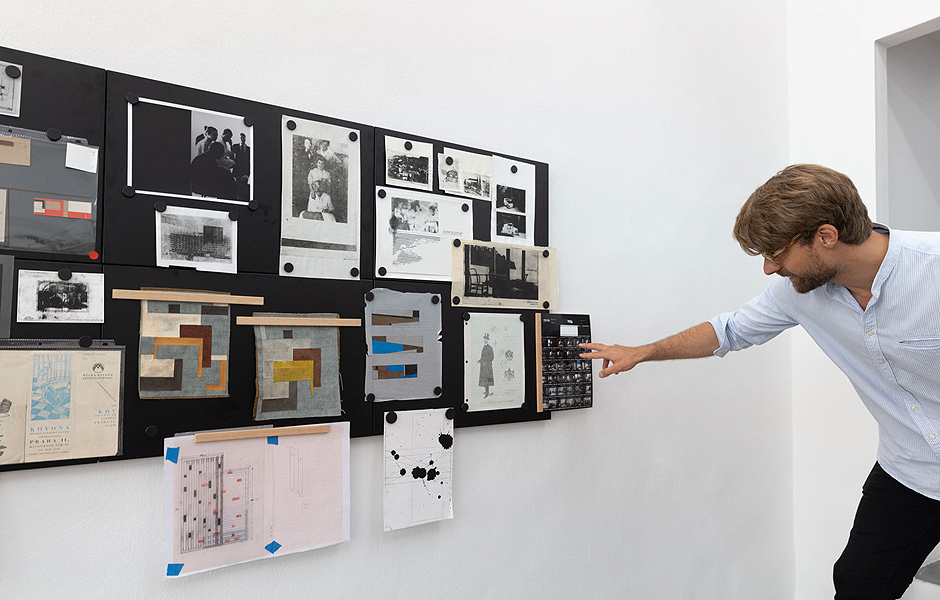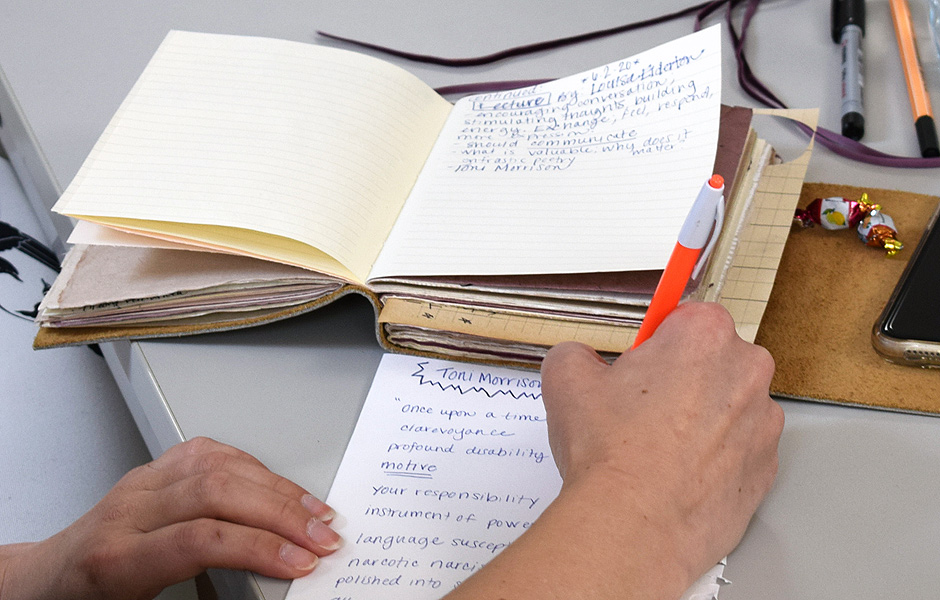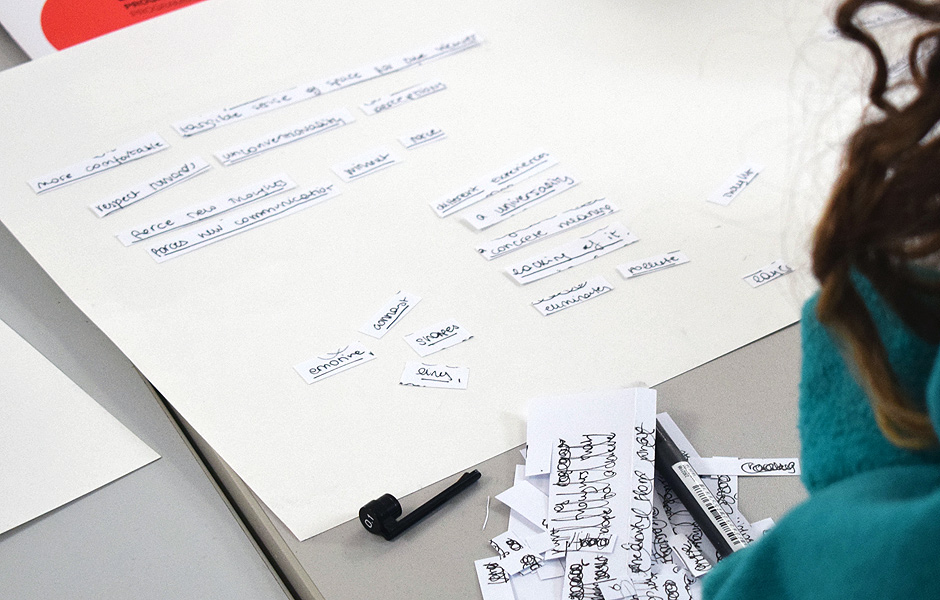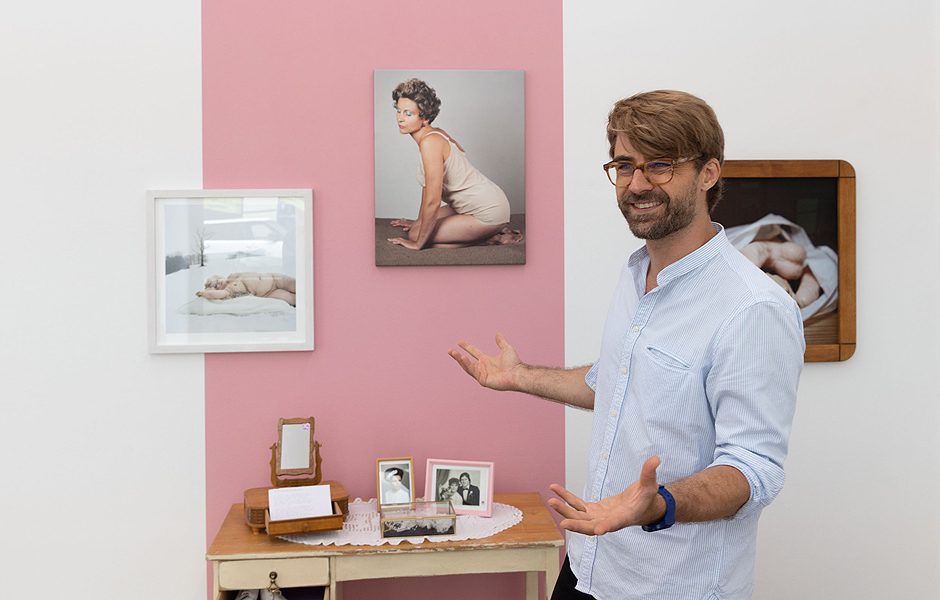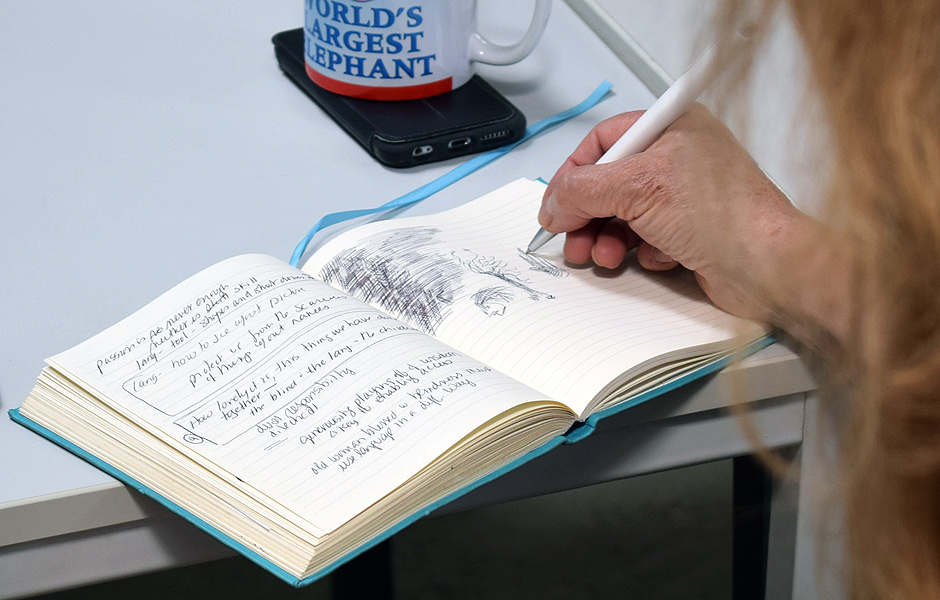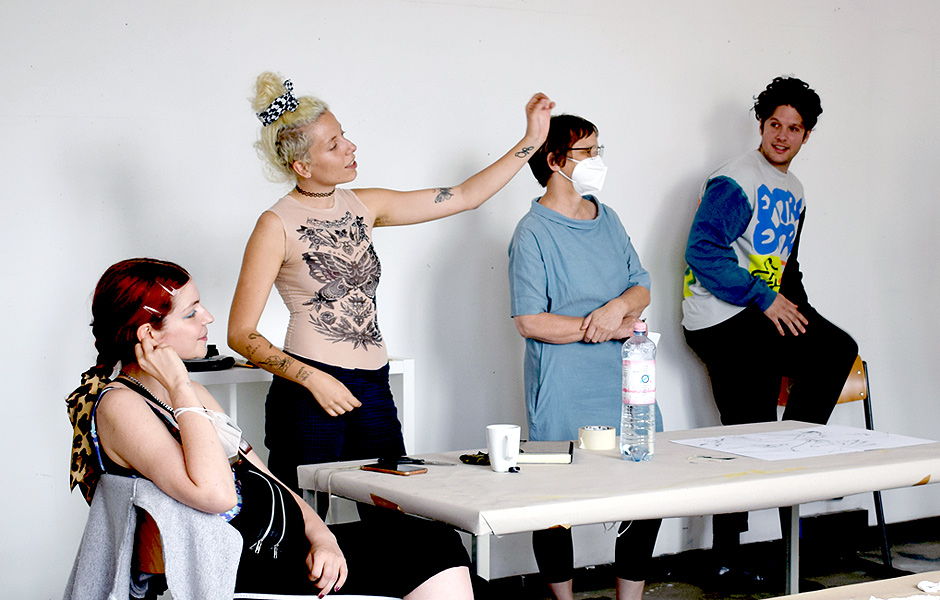Summer School Course FROM SELF TO STATEMENT: Ways to Mediate your Art by Dr. Klaus Speidel
General Course Description
“Many artists prefer their works to “speak for themselves” and dread the task of writing or speaking about their practice. Yet, works that may seem self-explanatory to ourselves rarely are for others and there are scenarios where silence is not an option. In applications for exhibitions, grants, or artist residencies, presentations and written statements are crucial. The prospect of having to write or speak during such instances can be daunting: What makes my work particular? What keeps it together? What should be the focus? Should I talk more about intentions or technique? How do I initiate a conversation, engage diverse audiences, or pique a curator or critic’s interest in my practice?
It’s hard to figure out all of these things on our own. So take this rare opportunity for learning and honest and respectful guidance and feedback from your instructor, a and peers in this 5-day intensive Summer Course held at the BERLIN ART INSTITUTE from July 01 to 05, 2024.
To develop just and inspiring ways to convey what your work is about, you will first work towards a better understanding of what makes you unique as an artist to then develop ways to articulate a discourse based on this understanding of your artistic self.
Alongside discussions on the values and pitfalls of writing and talking about our creations, the Summer Course will focus on the artist statement, including introductions to your portfolio and website; descriptions of a series of works or an exhibition; and ways to navigate casual encounters, such as openings or dinners. Please make sure to bring any personal materials, such as an application you’re working on, so we can engage with them. By concentrating on your personal practice and its unique aspects, along with your specific needs, we will ensure that the way you talk and write accurately reflects and enhances the art you create.
Based on your work and interest, we will identify multiple building-blocks that you can use when talking and writing about yourself and your art and that you can recombine on different occasions. After the class, you will approach writing and talking about your art more conscioulsy and with confidence. Based on your learnings and the materials provided by the instructor, you will be able to evolve the way you speak alongside any changes in your practice.
Whether you feel overwhelmed when you think of having to speak or write about your practice or you’re already a confident communicator, this class will bring you to the next level and keep you going in the future.
After the class, you will approach writing and talking about your art more consciously and with confidence.” (Text & photos by courtesy of Dr. Klaus Speidel )
Learning Outcomes
Guided by the instructor, you will
- gain a deeper understanding of your artistic quest and what makes it special
- figure out which concepts or forms make you unique as an artist
- start developing your artist persona
- identify concepts and ideas that best represent you and your practice, so your explanations don’t sound generic
- understand which style of writing and speaking best corresponds to you as an artist and your work
- develop an artist pitch (or short oral form of introducing your practice and engaging your listeners) that you can adapt on different occasions
- learn to feel confident in writing and speaking about your practice, whether you have to do with a curator, gallery owner or collectors and even non-experts.
- discover the tools you need to keep evolving your statement as well as your “artist pitch” as your art evolves.
- based on your work and interest, we will identify multiple building-blocks that you can use when talking and writing about yourself and your art and that you can recombine on different occasions
General Guidelines
This Summer Course is open to anyone who has the desire to communicate and evolve their understanding of their own work by writing and talking systematically about it, experienced or not. Please bring your own writing devices. A laptop is recommended for easier sharing and exchange of texts in the group. We encourage all participants to come with an open mind and a willingness to engage in thoughtful, constructive feedback sessions with both the instructor and their peers. Respectful communication and active listening are essential for creating a supportive and collaborative learning environment. We also recommend that you bring any relevant materials or works-in-progress that you would like to discuss or receive feedback on during the course. The class will be in English, yet the instructor, who also regularly publishes in German and French can also provide feedback on writing in these languages additionally.
Benefits
Methods and Topics of Teaching
Throughout the Summer Course, we’ll alternate between sessions where we introduce methods and approaches to writing and individual self-exploration, writing and feedback sessions, where you can experiment and apply your newfound insights to your own work. We’ll cover a range of topics, from the tricks of the trade in common forms of writing such as statements, applications or press releases, to exploring new ground and even discussing the possibilities and challenges of incorporating A.I. technologies into your creative process if you wish to do so. Using a framework developed by Dr. Klaus Speidel, you’ll learn to approach your statement and pitch systematically and you’ll feel more confident in your choices as a contemporary artist and your ability to produce engaging and meaningful texts for diverse audiences. By the end of the course, you’ll leave with practical tools and the ability to produce texts and statements that reflect your unique perspective and voice.
Program Structure with Daily Course Description
Day 1
9:30 AM Reception at the BAI
Presentations and Discovery of Your Personal Building Blocks
Morning Session: The first day of the Summer Course begins with a presentation of the course and introductions, where participants get to know each other’s work, but also the motivations and goals for the course, which will be used to adapt the rest of the class. You will learn about the importance of discovering your personal quest and how it can help you to develop your unique voice.
Afternoon Session: The afternoon focuses on identifying conceptual, biographical and formal building blocks to talk and write about your work in engaging and illuminating ways. We will start with an exercise to help you identify which might be events, concepts, ideas, forms, etc. that make your practice unique – and you will likely discover some you never even thought of before – in order to then incorporate these in your future texts and statements. You will get a chance to refine and evolve them with your peers and the instructor.
Day 2
Artist “Pitch” and preparing the Artist Statement
Morning Session: Based on the conceptual, biographical and formal building blocks you discovered the previous day, you will develop an “artist pitch” that you can use when you have a chance to introduce yourself in a social setting or formal presentation. The morning ends with a first round of presentations and feedback in the group.
Afternoon Session: At the beginning of the afternoon, you get a chance to refine your “pitch” from the morning based on feedback from your peers and instructor. Your instructor is available for help and feedback.
The day will end with the introduction of a framework for reworking or developing your artist statement.
Day 3
Artist Statement I
Afternoon Session: In the afternoon, your peers and the instructor will give you feedback for you to rework the statement.
Day 4
Artist Statement II and Free Format
Morning Session: The fourth day of the Summer Course, you have a chance to refine your statement based on the feedback of the day before. The morning ends with a presentation and discussion of the new versions, which will now be appropriate to your practice and professional.
Afternoon Session: In the afternoon, you will learn about different formats for writing and speaking that are relevant to a career in the arts. You then have a chance to work on a format of your choosing, e.g. an application letter, a presentation for an exhibition, a press release, a portfolio show or a short oral presentation of your practice. The day will end with presentations and feedback.
Day 5
Bringing it all together. Recapitulation and Final Writing/Feedback Round
Morning Session: The morning will be dedicated to a final writing and feedback round. You can choose to rework any of the formats you discovered during the week and apply the skills and knowledge you have acquired. You will again have the opportunity to receive feedback from other participants and the instructor, and share your final piece with the group.
Afternoon Session: The final day of the Summer Course ends with a recapitulation of the week and thoughts about continuing to implement the learnings in the future. You can then share how your understanding of your work and the role of speaking and writing have evolved and receive feedback from other participants.
Day 6 & 7
While Saturday and Sunday are not formally part of the class, you may want to consider extending your stay to explore the lively scene in Berlin, perhaps with newfound friends and contacts from BERLIN ART INSTITUTE.
General Information
Duration: July 01 – 05, 2024
Hours: Each day from 10 AM – 4 PM (including several breaks & lunchtime)
Seats: Min: 6 | Max: 20 | Language: English
Fees: There is a one-off registration fee of €50. The participation fee is €850 per person (without accommodation).
The fee is VAT-exempt by the Governing Mayor of Berlin – Senate Chancellery Higher Education and Research pursuant to Paragraph 4 No. (21) (a)(bb) UStG (German Value Added Tax Act).
Your Summer School Instructor
Dr. Klaus Speidel is an art critic and curator, art and image theorist, and winner of the prestigious AICA France prize for Art Criticism awarded by the international association of art critics. He studied philosophy and art history in Munich (LMU) and Paris (Ecole normale supérieure, Paris X Nanterre, Sorbonne) and teaches at the Paris College of Art and the University for Applied Arts in Vienna. He previously held teaching positions at the Sorbonne, Université Paris Diderot, as well as the Universities of Konstanz and Vienna and at numerous fine arts and design academies, such as the design academy Strate in Paris and the HDK in Gothenburg. He was also invited to teach Writing in, on and through art at the Salzburg Summer Academy for several years and currently teaches “AI, Algorithms and Art” at the University for Applied Arts in Vienna. In the past, he consulted with Tadao Ando in Osaka as well as Kengo Kuma in Paris and Atelier 522 Markdorf/Zurich.
Beyond numerous publications on topics related to art, narrative, visual storytelling, depiction, style, drawing and digital, Klaus Speidel writes essays and reviews for the Frankfurter Allgemeine Zeitung, Der Standard, Spike Art Quarterly, artpress, The Art Newspaper, Parnass or The Brooklyn Rail and in catalogues, for instance for the Centre Pompidou, Schirn Kunsthalle, mumok, Albertina, Belvedere, FRAC Franche-Comté, mudam Luxemburg and Kunsthalle Tübingen and Wien. He curated and co-curated exhibitions in Germany, Austria and France in museums and galleries like the Dom Museum Wien, Kunsthalle Wien, Kunstraum Memphis, Galerie Vincenz Sala, Xpo Gallery Paris or Galerie Krinzinger, regularly experimenting with new ways to write and conceive exhibition narratives. He was a guest on the Arte TV show Philosophie with the topic « Image » and a keynote speaker at different international events. Some of his recent curations were Interference. Traces, stories and ghosts (Curated by in Vienna at Galerie Krobath), A shop is a shop is a shop (Kunsthalle Wien, Vienna), Narrating narrativity (Krinzinger Schottenfeld, Vienna) and Fragile Narratives(Kunstraum Memphis, Linz). He also co-curated Fragile Creation and Show me your wound (co-curated with Johanna Schwanberg, Dom Museum Vienna) and De l’écriture de l’écriture (Galerie Vinzenz Sala, Paris) and is currently working on Being mortal, an exhibition addressing death and dying that will open at Dom Museum Vienna in October 2023. As the co-founder of Verein K, he organises and facilitates « Crit Cross. A Forum on Art Criticism ».
More information on the Academia Website and on Instagram.
